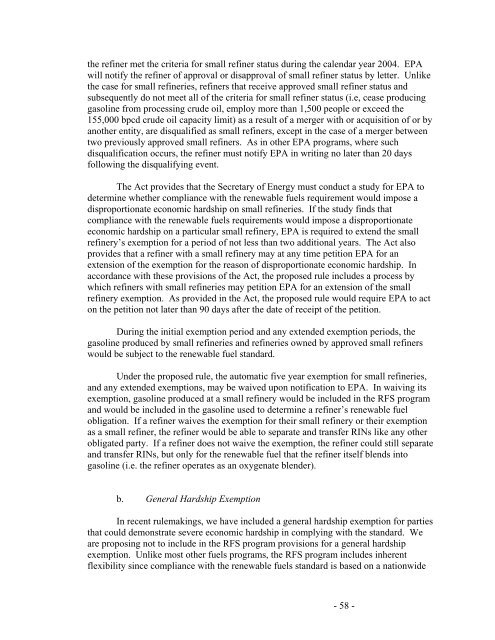Regulation of Fuels and Fuel Additives: Renewable Fuel Standard ...
Regulation of Fuels and Fuel Additives: Renewable Fuel Standard ...
Regulation of Fuels and Fuel Additives: Renewable Fuel Standard ...
You also want an ePaper? Increase the reach of your titles
YUMPU automatically turns print PDFs into web optimized ePapers that Google loves.
the refiner met the criteria for small refiner status during the calendar year 2004. EPA<br />
will notify the refiner <strong>of</strong> approval or disapproval <strong>of</strong> small refiner status by letter. Unlike<br />
the case for small refineries, refiners that receive approved small refiner status <strong>and</strong><br />
subsequently do not meet all <strong>of</strong> the criteria for small refiner status (i.e, cease producing<br />
gasoline from processing crude oil, employ more than 1,500 people or exceed the<br />
155,000 bpcd crude oil capacity limit) as a result <strong>of</strong> a merger with or acquisition <strong>of</strong> or by<br />
another entity, are disqualified as small refiners, except in the case <strong>of</strong> a merger between<br />
two previously approved small refiners. As in other EPA programs, where such<br />
disqualification occurs, the refiner must notify EPA in writing no later than 20 days<br />
following the disqualifying event.<br />
The Act provides that the Secretary <strong>of</strong> Energy must conduct a study for EPA to<br />
determine whether compliance with the renewable fuels requirement would impose a<br />
disproportionate economic hardship on small refineries. If the study finds that<br />
compliance with the renewable fuels requirements would impose a disproportionate<br />
economic hardship on a particular small refinery, EPA is required to extend the small<br />
refinery’s exemption for a period <strong>of</strong> not less than two additional years. The Act also<br />
provides that a refiner with a small refinery may at any time petition EPA for an<br />
extension <strong>of</strong> the exemption for the reason <strong>of</strong> disproportionate economic hardship. In<br />
accordance with these provisions <strong>of</strong> the Act, the proposed rule includes a process by<br />
which refiners with small refineries may petition EPA for an extension <strong>of</strong> the small<br />
refinery exemption. As provided in the Act, the proposed rule would require EPA to act<br />
on the petition not later than 90 days after the date <strong>of</strong> receipt <strong>of</strong> the petition.<br />
During the initial exemption period <strong>and</strong> any extended exemption periods, the<br />
gasoline produced by small refineries <strong>and</strong> refineries owned by approved small refiners<br />
would be subject to the renewable fuel st<strong>and</strong>ard.<br />
Under the proposed rule, the automatic five year exemption for small refineries,<br />
<strong>and</strong> any extended exemptions, may be waived upon notification to EPA. In waiving its<br />
exemption, gasoline produced at a small refinery would be included in the RFS program<br />
<strong>and</strong> would be included in the gasoline used to determine a refiner’s renewable fuel<br />
obligation. If a refiner waives the exemption for their small refinery or their exemption<br />
as a small refiner, the refiner would be able to separate <strong>and</strong> transfer RINs like any other<br />
obligated party. If a refiner does not waive the exemption, the refiner could still separate<br />
<strong>and</strong> transfer RINs, but only for the renewable fuel that the refiner itself blends into<br />
gasoline (i.e. the refiner operates as an oxygenate blender).<br />
b. General Hardship Exemption<br />
In recent rulemakings, we have included a general hardship exemption for parties<br />
that could demonstrate severe economic hardship in complying with the st<strong>and</strong>ard. We<br />
are proposing not to include in the RFS program provisions for a general hardship<br />
exemption. Unlike most other fuels programs, the RFS program includes inherent<br />
flexibility since compliance with the renewable fuels st<strong>and</strong>ard is based on a nationwide<br />
- 58 -
















